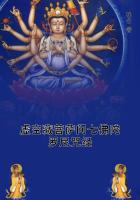In that view matter is not merely mutually penetrable; but each atom extends, so to say, throughout the whole of the solar system, yet always retaining its own centre of force.'
It is the operation of a mind filled with thoughts of this profound, strange, and subtle character that we have to take into account in dealing with Faraday's later researches. A similar cast of thought pervades a letter addressed by Faraday to Mr. Richard Phillips, and published in the 'Philosophical Magazine' for May, 1846. It is entitled 'Thoughts on Ray-vibrations,' and it contains one of the most singular speculations that ever emanated from a scientific mind. It must be remembered here, that though Faraday lived amid such speculations he did not rate them highly, and that he was prepared at any moment to change them or let them go. They spurred him on, but they did not hamper him. His theoretic notions were fluent; and when minds less plastic than his own attempted to render those fluxional images rigid, he rebelled. He warns Phillips moreover, that from first to last, 'he merely threw out as matter for speculation the vague impressions of his mind; for he gave nothing as the result of sufficient consideration, or as the settled conviction, or even probable conclusion at which he had arrived.'
The gist of this communication is that gravitating force acts in lines across space, and that the vibrations of light and radiant heat consist in the tremors of these lines of force. 'This notion,' he says, 'as far as it is admitted, will dispense with the ether, which, in another view is supposed to be the medium in which these vibrations take place.' And he adds further on, that his view 'endeavours to dismiss the ether but not the vibrations.' The idea here set forth is the natural supplement of his previous notion, that it is gravitating force which constitutes matter, each atom extending, so to say, throughout the whole of the solar system.
The letter to Mr. Phillips winds up with this beautiful conclusion:--'I think it likely that I have made many mistakes in the preceding pages, for even to myself my ideas on this point appear only as the shadow of a speculation, or as one of those impressions upon the mind which are allowable for a time as guides to thought and research. He who labours in experimental inquiries, knows how numerous these are, and how often their apparent fitness and beauty vanish before the progress and development of real natural truth.'
Let it then be remembered that Faraday entertained notions regarding matter and force altogether distinct from the views generally held by scientific men. Force seemed to him an entity dwelling along the line in which it is exerted. The lines along which gravity acts between the sun and earth seem figured in his mind as so many elastic strings; indeed he accepts the assumed instantaneity of gravity as the expression of the enormous elasticity of the 'lines of weight.' Such views, fruitful in the case of magnetism, barren, as yet, in the case of gravity, explain his efforts to transform this latter force. When he goes into the open air and permits his helices to fall, to his mind's eye they are tearing through the lines of gravitating power, and hence his hope and conviction that an effect would and ought to be produced. It must ever be borne in mind that Faraday's difficulty in dealing with these conceptions was at bottom the same as that of Newton; that he is in fact trying to overleap this difficulty, and with it probably the limits prescribed to the intellect itself.
The idea of lines of magnetic force was suggested to Faraday by the linear arrangement of iron filings when scattered over a magnet.
He speaks of and illustrates by sketches, the deflection, both convergent and divergent, of the lines of force, when they pass respectively through magnetic and diamagnetic bodies. These notions of concentration and divergence are also based on the direct observation of his filings. So long did he brood upon these lines; so habitually did he associate them with his experiments on induced currents, that the association became 'indissoluble,' and he could not think without them. 'I have been so accustomed,' he writes, 'to employ them, and especially in my last researches, that I may have unwittingly become prejudiced in their favour, and ceased to be a clear-sighted judge. Still, I have always endeavoured to make experiment the test and controller of theory and opinion; but neither by that nor by close cross-examination in principle, have I been made aware of any error involved in their use.'
In his later researches on magne-crystallic action, the idea of lines of force is extensively employed; it indeed led him to an experiment which lies at the root of the whole question. In his subsequent researches on Atmospheric Magnetism the idea receives still wider application, showing itself to be wonderfully flexible and convenient. Indeed without this conception the attempt to seize upon the magnetic actions, possible or actual, of the atmosphere would be difficult in the extreme; but the notion of lines of force, and of their divergence and convergence, guides Faraday without perplexity through all the intricacies of the question. After the completion of those researches, and in a paper forwarded to the Royal Society on October 22, 1851, he devotes himself to the formal development and illustration of his favourite idea. The paper bears the title, 'On lines of magnetic force, their definite character, and their distribution within a magnet and through space.'
A deep reflectiveness is the characteristic of this memoir.
In his experiments, which are perfectly beautiful and profoundly suggestive, he takes but a secondary delight. His object is to illustrate the utility of his conception of lines of force.
'The study of these lines,' he says, 'has at different times been greatly influential in leading me to various results which I think prove their utility as well as fertility.'














